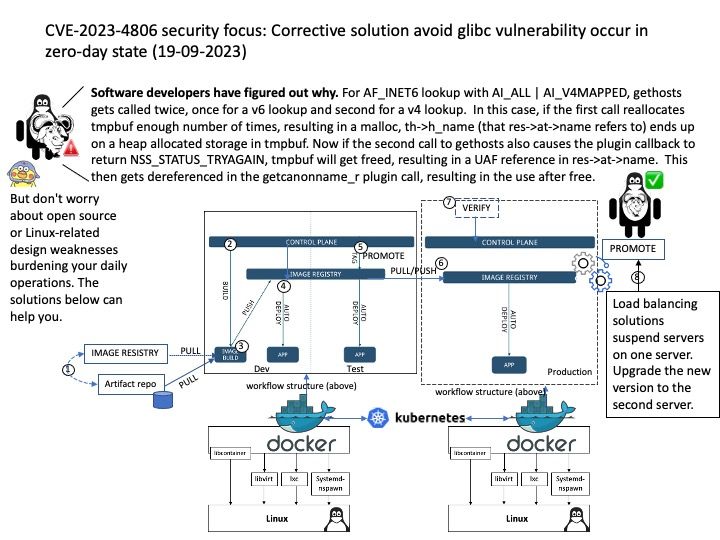
Preface: This vulnerability published on September 12, 2023. It had CVSS V3 base score 5.3. But based on the vulnerability details described, it seems it is unknown causes. But why does it happen?
Background: The GNU C Library project provides the core libraries for the GNU system and GNU/Linux systems, as well as many other systems that use Linux as the kernel. These libraries provide critical APIs including ISO C11, POSIX.1-2008, BSD, OS-specific APIs and more. These APIs include such foundational facilities as open, read, write, malloc, printf, getaddrinfo, dlopen, pthread_create, crypt, login, exit and more.
The Name Service Switch (NSS) configuration file, /etc/nsswitch[.]conf, is used by the GNU C Library to determine the sources from which to obtain name-service information in a range of categories, and in what order.
Vulnerability details: A flaw was found in glibc. In an extremely rare situation, the getaddrinfo function may access memory that has been freed, resulting in an application crash.
This issue is only exploitable when a NSS module implements only the _nss_*_gethostbyname2_r and _nss_*_getcanonname_r hooks without implementing the _nss_*_gethostbyname3_r hook.
The resolved name should return a large number of IPv6 and IPv4, and the call to the getaddrinfo function should have the AF_INET6 address family with AI_CANONNAME, AI_ALL and AI_V4MAPPED as flags.
Therefore, it triggers a use-after-free vulnerability.
What I added during my observation: When malloc hooks is enabled, then the hook pointers are set to the current default allocation functions. It is expected that if an app does intercept the allocation/free calls, it will eventually call the original hook function to do allocations.
Software developers have figured out why: For AF_INET6 lookup with AI_ALL | AI_V4MAPPED, gethosts gets called twice, once for a v6 lookup and second for a v4 lookup. In this case, if the first call reallocates tmpbuf enough number of times, resulting in a malloc, th->h_name (that res->at->name refers to) ends up on a heap allocated storage in tmpbuf. Now if the second call to gethosts also causes the plugin callback to return NSS_STATUS_TRYAGAIN, tmpbuf will get freed, resulting in a UAF reference in res->at->name. This then gets dereferenced in the getcanonname_r plugin call, resulting in the use after free.
Official announcement: For details, please refer to the link – https://nvd.nist.gov/vuln/detail/CVE-2023-4806